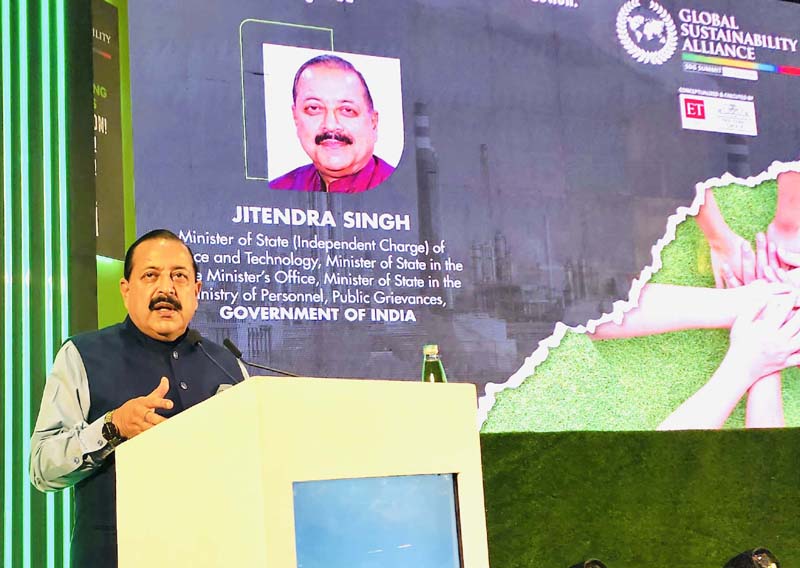
Excelsior Correspondent
NEW DELHI, Sept 28: Union Minister of State (Independent Charge) Science & Technology; MoS PMO, Personnel, Public Grievances, Pensions, Space and Atomic Energy, Dr. Jitendra Singh has said that India is committed to achieve the “Net Zero” emissions target by 2070.
Delivering keynote address at “Global Sustainability Alliance” meet, organised by the Times Group here today, Dr Jitendra Singh said, “We are fully committed to contribute in attaining the United Nations Sustainable Development Goals (SDGs) – by way of Research and Innovation through international collaboration and partnerships”,
The Union Minister said, India is set to achieve its short term and long term targets under the Panchamrit action plan, like- reaching a non-fossil fuel energy capacity of 500 GW by 2030; fulfilling at least half of its energy requirements via renewable energy by 2030; reducing CO2 emissions by 1 billion tons by 2030; reducing carbon intensity below 45 percent by 2030; and finally pave the way for achieving a Net-Zero emission target by 2070.
Dr Jitendra Singh said, Government of India through Public -Private partnerships is ensuring the funding for clean energy innovations as envisioned under Mission Innovation 2.0. Referring to the G20 Summit earlier this month, he said the New Delhi Declaration committed itself to implement India’s initiative of ‘Lifestyle for Environment Mission’ (LiFE) and promote Artificial Intelligence towards achieving the UN SDGs. By adopting the ‘Green Development Pact,’ G-20 has also reaffirmed its commitments to sustainable and green growth, he added.
The Union Minister said that the Global Biofuels Alliance (GBA) to be led by India, Brazil and the United States, as leading biofuel producers and consumers, will greatly help achieve the MDG Goals of India turning Net Zero by 2070.
Dr Jitendra Singh said India stands committed to an ambitious Nationally Determined Contributions (NDCs) of reducing emission intensity by 33-35% in 2030 against the levels of year 2005. “We have already achieved our commitment of 40% energy production from renewable sources, way ahead of the 2030 Paris Agreement target,” he said.
The Minister reiterated India is implementing the largest Renewable Energy (RE) expansion program in the world, envisaging a 5-fold increase in the overall RE capacity. “India’s energy-mix strategies include a larger shift toward clean energy alternatives, increased manufacturing capacities, energy use efficiency and a policy push for Hydrogen including production-linked incentives. In addition, the emerging technologies like 2G Ethanol Pilot, Comfort climate box for tropical regions, Hydrogen Valleys, Heating and cooling virtual repository, are all on the table,” he said.
Dr Jitendra Singh said India has developed a roadmap and a strategy for a Bio-based economy which is inching towards 150 billion USD by the year 2025. India has established 5 Bioenergy Centers with an interdisciplinary team working on advance sustainable biofuels using modern biotechnology tools, he added.
Dr Jitendra Singh said, India is among the few countries in the world to design a Cooling Action Plan (CAP) with a long-term vision (spanning a 20-year period from 2017-18 to 2037-38) that addresses cooling requirements across sectors.
He said that a draft R&D Roadmap for Green Hydrogen Ecosystem in India has been released and a public-private partnership framework for R&D called the Strategic Hydrogen Innovation Partnership or SHIP will be facilitated under the Mission.
Dr Jitendra Singh further said that nearly 9% share of electricity is likely to be contributed from India’s nuclear sources by the year 2047. The Department of Atomic Energy aims to achieve 20 GW capacity of nuclear power generation by the year 2030 which will be a major milestone placing India as the third largest producer of atomic energy in the world after the USA and France, he added.
Dr Jitendra Singh said, the National Research Foundation (NRF) Bill, 2023, passed by the Parliament in the last session, will promote the culture of research and innovation throughout India’s universities, colleges, research institutions, and R&D laboratories at a total estimated cost of Rs 50,000 crores during five years and this will give further impetus to Clean energy research in India and Mission innovation. As much as 70% of its funding will come from non-governmental sources, he said.
Dr Jitendra Singh said, Precision irrigation, Innovative clean water technologies, such as water purification systems, desalination techniques, and wastewater treatment technologies are to be further augmented and implemented.

